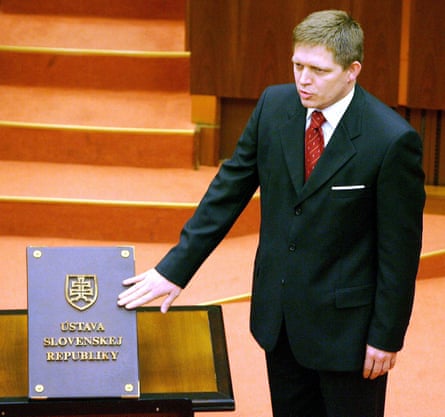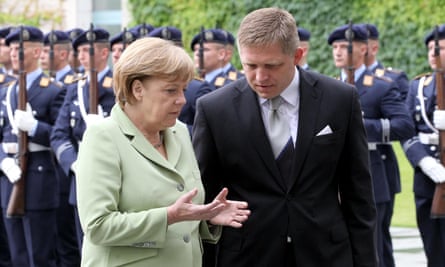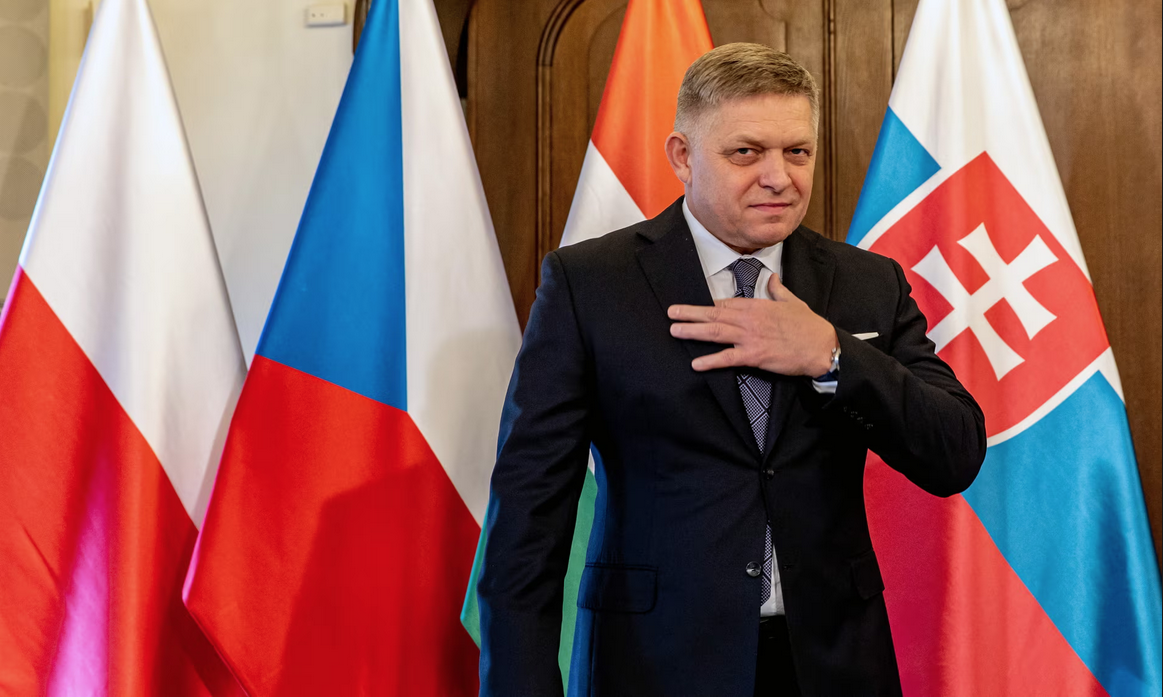The veteran politician shot and wounded on Wednesday, is a fan of Viktor Orbán and has embraced ever more extreme positions to retain power
Slovakia’s populist prime minister, Robert Fico, who was shot and wounded on Wednesday, is a burly and brash political veteran known for his attacks on the media, NGOs and prosecutors.
Having enjoyed three previous stints as prime minister, Fico, 59, is well known to voters and observers – and critics, who accuse him of seeking to emulate Viktor Orbán, his friend in neighbouring Hungary, by trying to undermine checks and balances and cement his power while also taking a friendlier stance toward Russia.
Fico’s return to power last year has prompted concern inside and outside his country, which critics say is becoming increasingly febrile and polarised under his watch. Journalists in Slovakia have expressed alarm over a recent government decision that would replace the country’s public broadcaster and, they say, open it up to political influence.
Meanwhile, Fico’s move to close down a special prosecutor’s office focused on high-level corruption has raised the possibility that the EU could freeze some funding allocated to Slovakia.
Legislation that would label civil society groups that receive more than €5,000 (£4,300) a year in international funding as “organisations with foreign support” has also triggered worries in the EU and among NGOs. Amnesty International Slovakia has described the bill as “a thinly disguised attempt to stigmatise civil society organisations that are critical of the authorities and hamper their vital work”.
Fico is typical of the new wave of nationalist-populist politicians who have emerged over the last decade, riding the wave of resentment generated among tens of millions of Europeans by the disappointments of the 21st century.
He grew up in Topoľčany, a small town in Slovakia’s west, the son of a forklift truck driver and a shop worker. Soviet tanks had crushed the Czechoslovak reform movement when he was three years old and few expected any change to the iron grip of the Communist party on what was then Czechoslovakia during his early years.
As a young man, Fico remained very much within the system, doing his military service as an investigator, earning a PhD for his study of capital punishment and then working in the legal branch of the Slovak Academy of Sciences.
But the fall of the Berlin Wall, the non-violent Velvet Revolution that ended communist rule in Czechoslovakia, and Slovakia’s independence, ushered in a new, freewheeling capitalist era that offered business and political opportunities.
Fico, who was young, convincing – and, importantly, untainted by any association with the fallen communist regime – was quick to realise his childhood ambition to enter politics.
He progressed rapidly. After joining the Party of the Democratic Left, he moved to found Smer – sociálna demokracia (Direction – Social Democracy). The new organisation paid lip service to both democracy and socialism, though many observers quickly concluded that its ideology came second to Fico’s own ambitions.

Seven years of opposition led to victory in elections in 2006. This proved the political potency of promising to protect those left behind in a country where living standards for many were only slowly catching up to western Europe, and where, in consequence, many were nostalgic for the communist-era past.
Out of power in 2010, Fico’s party won again two years later after another centre-right coalition broke up. A tough stance against migrants brought re-election in 2016. But then, when the journalist Ján Kuciak, who was investigating high-level corruption, and his fiancee, Martina Kušnírová, were murdered by a contract killer in 2018, Fico ran into trouble again. Huge protests forced him to resign. Smer lost power in the 2020 election to parties pledging to weed out corruption, and his party split.
Fico would not give up, however, preferring a brutal political battle to indulging his taste for bodybuilding or fast cars. When it arrived, the Covid pandemic offered Fico – then polling under 10% – a new opportunity.

“He became the most prominent political representative of a movement against face masks or vaccination,” said Grigorij Mesežnikov, a political analyst in Bratislava.
The Smer leader had himself faced criminal charges, which he has always denied, over allegedly creating a criminal group and misuse of power, but Slovakia’s prosecutor-general threw out the indictment. This offered further motivation to win back power.
“He is borrowing from [Donald] Trump and will do and say what is needed, taking from right and left,” said Milan Nič, a senior research fellow at the German Council on Foreign Relations, shortly before last year’s election.
“He’s been very skilful at positioning himself as anti-establishment. His main interest now is to dismantle the judicial effort … He is escaping by winning.”

To this end, Fico has embraced more extreme positions that include attacks on western allies, pledges to stop military support for Kyiv, criticism of sanctions on Russia and threats to veto any future Nato invitation for Ukraine. He has also worked hard to exploit the division between older, more conservative provincial voters and those in the capital, Bratislava, with its more progressive culture, and wealthier and often more educated population.
One of Fico’s targets has been the country’s liberal president, the former human rights lawyer and activist Zuzana Čaputová, whom he has called a “US puppet” and who sued him last year for spreading lies about her. Fico has also labelled various opponents and NGOs as following the instructions of the US financier George Soros. Another target has been Slovakia’s LGBT community.
Fico, whom analysts regard as being inspired by Orbán in Hungary, insists he has Slovakian interests at heart.
“We see Viktor Orbán as one of those European politicians who do not fear to openly defend the interests of Hungary and Hungarian people,” Fico told Reuters last September. “He puts them in the first place. And that should be the role of an elected politician, to look after the interests of his voters and his country.”
Stay informed with The Namibian – your source for credible journalism. Get in-depth reporting and opinions for
only N$85 a month. Invest in journalism, invest in democracy –
Subscribe Now!






